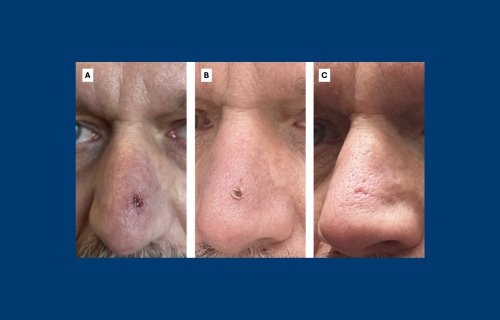Breakthrough Mpox Case Identified in Ireland Despite Vaccination
Thursday, 19 June, 2025
Share

New research published in (opens in a new window)The Lancet Infectious Diseases reports the first case of mpox occurring in a fully vaccinated individual despite high post-vaccine antibody levels. This unusual case, reported by Dr Joanne Byrne at the Centre for Experimental Pathogen Host Research (CEPHR) in University College Dublin (UCD), involved a middle-aged man who presented with a single, small lesion on his nose that tested positive for Monkeypoxvirus Clade IIb. He had received two doses of the Modified Vaccinia Ankara–Bavarian Nordic (MVA-BN) vaccine 2 years previously.
Mpox (formerly known as monkeypox) is a viral infection that is spread by close person to person contact. In 2022 there was a global outbreak of mpox, which predominantly affected gay and bisexual men who have sex with men. Vaccination and changes in behaviour led to a significant decrease in mpox cases. However, a further outbreak in Africa of Clade I virus is ongoing, with multiple fatalities, mostly in women and children. Cases of the Clade II also continue to be reported in Ireland in low numbers.
This case is unusual in that it presented with atypical symptoms and also occurred in someone who was vaccinated with high antibody levels. It raises important questions about how best to use mpox vaccines to protect against infection. It also suggests that health care providers need to continue to be vigilant for unusual mpox cases in vaccinated and unvaccinated individuals.
“This is the first reported case of breakthrough mpox in an individual with sustained antibody responses following vaccination,” said Professor Patrick Mallon, Principal Investigator of the All-Ireland Infectious Diseases (AIID) Cohort study and Director of CEPHR. “It reinforces the need to better understand how immune responses to vaccination translate to clinical protection and further research into a potential role for booster vaccinations.”
This case is the latest in a number of important findings on Mpox made by UCD CEPHR. In an analysis of over 120 participants within the AIID cohort sampled two years post-vaccination, antibody levels were shown to have reduced substantially, raising questions about the potential need for booster vaccines. The group have also developed a mpox specific antibody test that can measure antibodies that is now being used in clinical trials in Europe and Africa.
The Mpox-Vax study is actively enrolling adults eligible for vaccination at hospitals in Dublin, Galway, and Cork. Mpox-Vax is examining how long vaccine-induced immune responses last and how well vaccine induced immunity prevents infection.
In parallel, through the Mpox-Vax AFRIVAC consortium, funded by the EU, UCD is leading a team of researchers from the Democratic Republic of Congo, Uganda, and Tanzania to study vaccine responses in populations affected by the ongoing Clade I mpox public health emergency of international concern.
“These studies will help define how long vaccine protection lasts and identify individuals who may still be at risk,” said Professor Eoin Feeney, Chief Investigator of the Mpox-Vax study. “Understanding the trajectory of immune responses over time is key to informing effective future vaccination policies. We strongly recommend individuals at risk of mpox infection in Ireland who have not been vaccinated come forward for vaccination.”
 This research was supported by funding from the Health Research Board Ireland and the European & Developing Countries Clinical Trials Partnership (EDCTP). Read the full case report published in (opens in a new window)The Lancet Infectious Diseases.
This research was supported by funding from the Health Research Board Ireland and the European & Developing Countries Clinical Trials Partnership (EDCTP). Read the full case report published in (opens in a new window)The Lancet Infectious Diseases.
Photo 1: Evolution of a nasal mpox lesion in a vaccinated individual; Credit: The Lancet Infectious Diseases
Photo 2: Dr Joanne Byrne (lead investigator)